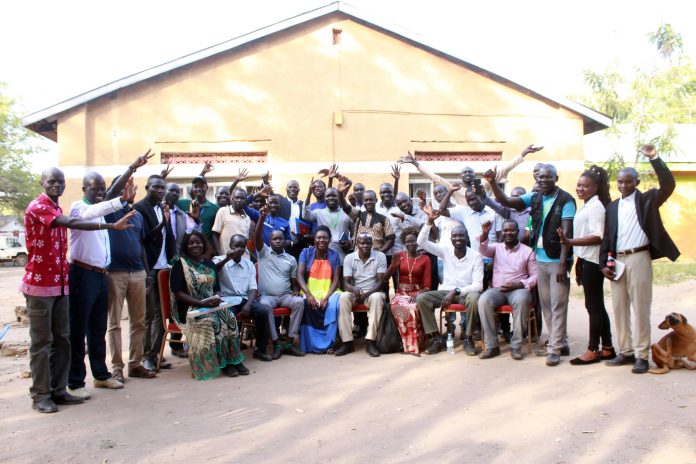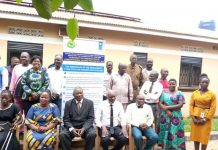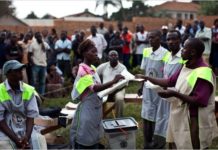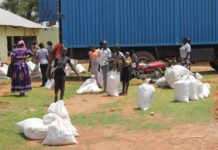By Alison Lemeri
Refugee leaders in Uganda have described localization as good news, but have called on donors for resources to boost local efforts in fulfilling the key promises including those made at the recent Global Refugee Forum in Geneva, Switzerland.
The call comes as more than 20 refugee-led organizations and refugee welfare council leaders from Bidibidi, Omugo, Rhino camp and Imvepi refugee settlements participated last month in a get-together event in Imvepi, Terego District of Northern Uganda.
Uganda refugee community made three key pledges at the global event including building resilience, supporting education, and restoration efforts.
“We are starting at 1.6 plus [refugee population]. We are receiving every day. In this region, you have Rhino camp receiving every day with an average of more than 50 people every day,” said Peter Gift, Refugee Welfare Council Three Chairperson for Rhino Camp.
Gift, who attended the 2023 Geneva meeting, is also the overall refugee representative in the country, a member to Refugee engagement forums and the Comprehensive Refugee Response Framework – CRRF.
Speaking at the Imvepi event, he told local organization leaders to ensure that resources donated are managed as required to maintain donor trust.
“We have showcased ourselves in front of the world. Uganda is one of the countries that was on the mirror. Allot of pledges have been made and a lot of money is going to come. But the task is now to us. Are we ready to receive? Lets prepare ourselves,” he said.
With the Ugandan government and UNHCR working with partners to implement the localization agenda, local leaders see channeling resources to local responders a vital policy. The localization strategy includes allowing International organizations to increasingly work with community-based actors, creating access to more resources in local humanitarian response.
According to Gift, refugee-led organizations also known as RLOs play an integral role in delivering an immediate response’ to their communities. He said more RLOs responses are needed more than ever in the midst of continued refugee arrival and diminishing response of international organizations.
“Localization is a good news and I confirm to you that this is by policy now. Most of you do not have the resources. Get yourselves together and be in consortiums,” he said.
“In the face of diminishing role of international partners, the gap of response is bigger,” said Peter Ayume, the Refugee Welfare Council chairperson of Imvepi refugee settlement, adding that “RLOs should step up to fill.
“We are all aware that food cut is on the rise where people are losing lives. As I talk today, from July up to September 2023, we had a total of 44 people who committed a crime through a rope. They committed suicide,” said Ayume of suicide cases in Rhino, Bidibidi, Imvepi amd Lobule settlements last year.
Among the people who died men are the most affected. Ask yourself why? Because each night you wake up your wife needs something at home. Each night you wake up your children need something to take. And then as a husband or father you have nothing to give. The end result is I better go for external peace than keeping being disturbed on earth.
The annual gathering of the organization leaders was organized by Refugee Innovation Network – RIN with support from Community Technology Empowerment Network – CTEN and other refugee organizations.
Ojas Ware, RINs secretary, said the RLOs gathering was aimed at presenting organization leaders share their progresses made, challenges faced and propose ways forward.
He said the networks coordinating role helped in the delivery of capacity building, strengthening local resource mobilization and engaging refugee organizations to find areas of collaborations among each other.
“You find that two or more CBOs are implementing the same project of peace building in the same location which is an area of duplication,” said Ware, who is also the Executive Director of Community Empowerment Network CENET in Rhino camp.
CTENs Executive Director, Peter Batali, was among the refugee delegation to the Geneva event, adding they advocated for connectivity for refugees.
“If our network is not okay. We can easily talk to MTN or Airtel to fix it. But do the community leaders have the tools for communicating? The RLOs are coming. Do you have the computers and gadgets to do your work? That is connectivity?
Meanwhile the upcoming launch of a coordination office in Arua for West Nile RLos will boost their facilitation of activities with partners in urban centers,” said Aloro Gordon Paul, vice chairperson of Refugee-led organizations Network in Westnile (RELON-WN).
Though inadequate, Aloro who also doubles as Executive Director of African Youth For Community Empowerment AYCE Uganda, a refugee-led organization in Rhino camp, said the office will act as a simple working space connected with internet.





